
9 minute read
SEE LIBRARY
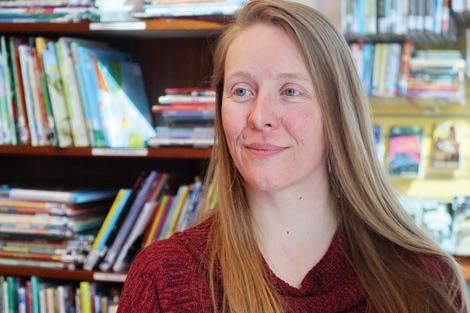
library,” said Bemis librarian Claire Mattoon. “And as staff, we had to continually emphasize that everyone has a right to be here.”
Mattoon has worked at Bemis since 2013 and, at the beginning of her third year on the job, began noticing more and more people who appeared to be homeless coming into the library. With that, Mattoon said, tensions increased.
There was no clear policy for staff to go off when it came to ensuring access for homeless patrons, Mattoon said, and usually it became a case-bycase issue.
“But then our leadership had some changes and there was a recognition that we needed more tools,” she said. “But some of the many challenges we had were actually not with folks experiencing homelessness but with people in Littleton who didn’t want to see the problem.”
The library’s shift in culture began in 2018 when the staff reviewed and updated several of its policies.
The most notable policy change was removing the ban on sleeping in the library, which staff said they found to be discriminatory towards those who are unhoused.
“We weren’t waking up the 90-yearold gentleman who had nodded off over his newspaper, or the 3-year-old child who fell asleep on the fl oor of the children’s room,” Mattoon said. “It was only there if we saw somebody who appeared to be of a certain economic status, and a lot of times it was something that other patrons came to us to report.”
Raburn said he usually doesn’t sleep in Bemis, because he feels it can be a bad look. But he knows others who do.
“If you’re homeless, you’re sleeping all the time,” he said.
Along with removing the sleeping ban, staff also began undergoing mandatory training on how to better communicate with homeless patrons as well as de-escalation tactics to avoid confl ict.
The library’s staff subscribe to the Librarian’s Guide to Homelessness, a series of online and in-person trainings from Ryan Dowd, the former director for Illinois’s second-largest homeless shelter.
For Library Director Nancy Trimm, the changes have made a huge difference.
“I think staff was struggling before we had the tools,” Trimm said.
The reasons for why those who are unhoused come to the library vary. It’s not always just for a warm place to rest, sometimes it’s to fi nd information on overnight shelters and food banks, which the library publishes and distributes an extensive list of. Sometimes, it’s to use a computer or a phone to access government benefi ts.
“Ultimately, we provide resources and information and try to connect people to that,” Trimm said.
Before 2018, Trimm said library staff would hear complaints about people who were homeless in the library about once a week. Most rarely rose above an annoyance, though sometimes library guests would ask staff to remove a person, Trimm said.
On occasion, police had to be called to the scene if a confl ict escalated to the point where staff safety was being threatened, but that was less common, Trimm said.
Since the policy changes, community resistance to seeing an unhoused person inside the library has lessened, according to Trimm. Staff are getting less complaints from patrons and more understanding about the needs of the unhoused.
“As a community, Littleton is talking about the problems of homelessness,” Trimm said, adding that conversation is needed to spark change. “If you don’t talk about an issue, there’s going to be a lot of fear.”
And Homelessness in the metro region continues to worsen.
A 2021 study by the Metro Denver Homelessness Initiative found the number of unhoused people in the Denver metro area climbed by 15% between 2018 and 2020.
From July 1, 2020, and June 30, 2021, more than 32,000 people were designated as homeless in the metro region, according to another study by the initiative.
While homelessness was on the rise before COVID, the pandemic made clear how easy it could be for someone to fi nd themselves struggling, Mattoon said, exacerbating issues of job loss, lagging wages and unaffordable housing.
“A lot of people that did not think they would ever be on the cliff edge economically ... suddenly realized how precarious life can be for anyone,” Mattoon said.
How long that empathy will last, Mattoon doesn’t know. But Trimm said the library will do all it can to continue to serve as a safe place and a resource.
“We’re going to be involved whether people want us to or not,” Trimm said.
Still, library staff aren’t social workers, and even with the training, Trimm said employees can feel the exhaustion of helping.
“Sometimes we do feel some compassion fatigue or burnout,” Trimm said.
It’s why she’s excited to see the progress that city staff has made as they try to introduce solutions to homelessness outlined in a 2019 action plan. Littleton has joined with the cities of Englewood and Sheridan to implement a laundry list of new actions, such as creating a homelessness navigation center and hiring a coordinator to oversee the efforts.
For Raburn, he’ll continue to visit Bemis as long as it remains open, or until he can fi nd a way out of his situation. Raburn said he is usually at the library three or four times a week, staying each time for several hours.
The earlier months of the pandemic were especially hard for Raburn, who had fewer places to go when libraries like Bemis shut down. When it reopened in-between waves of COVID, Raburn would think “woo-hoo, let’s go to the library!”
While he said the perception of homelessness in Littleton has improved, issues still remain. Whether he’s in the library, sitting in a cafe or walking in a park, what Raburn wants from those he’s around is kindness.
“I just think everybody should get along,” he said.


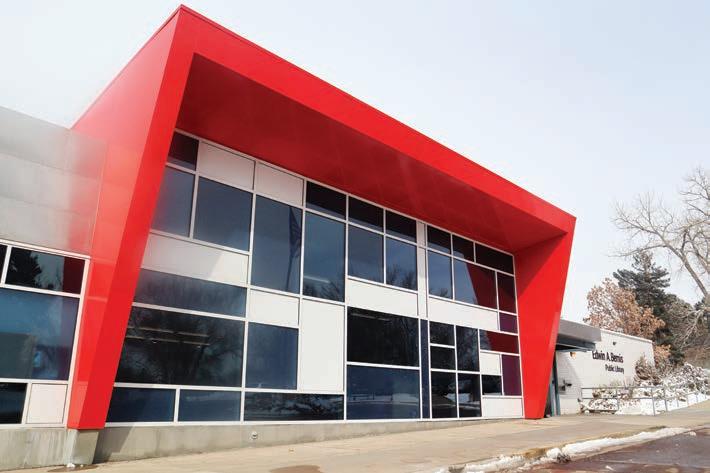
Bemis Library in Littleton has become a safe space and resource for those who are
homeless in the area. PHOTOS BY ROBERT TANN
Nancy Trimm, library director, sits at her desk last month. Trimm said since 2018, the library has updated its policies to be more supportive of those who are unhoused such as removing a sleeping ban and bolstering sta training to help with deescalation.
Librarian Claire Matoon said in the years that the library has taken a new approach to homeless guests, community tension around homelessness has also lessened.
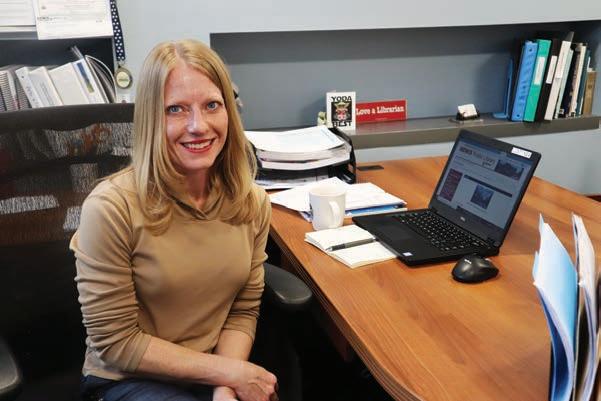


Castle Rock/Franktown WORLD MISSION CHURCH (KOREAN CHURCH)
7249 E. Park Dr. Franktown, CO TIME: 10:30 PM PHONE: 303-688-1004
ENGLISH TRANSLATION
EVERYONE IS WELCOME!
To advertise your place of worship in this section,
Serving the southeast Denver call Erin at 303-566-4074 or email area eaddenbrooke@ColoradoCommunityMedia.com
Greenwood Village
Congregation Beth Shalom Parker
Sunday Services - 10:00 a.m. Meditation before service - 9:30 a.m. Cimarron Middle School
12130 Canterberry Pkwy, Parker, CO 80138 www.CSLParker.org • (303) 805-9890
Advertise Here! Advertise Here!
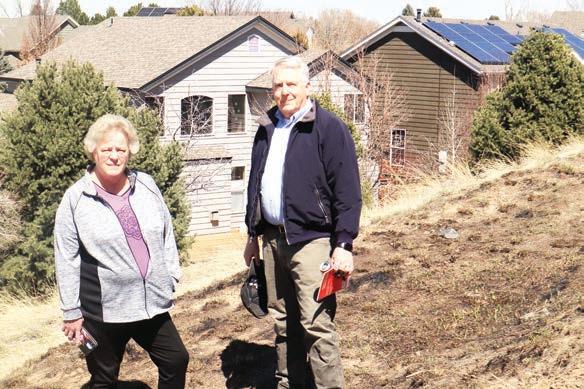

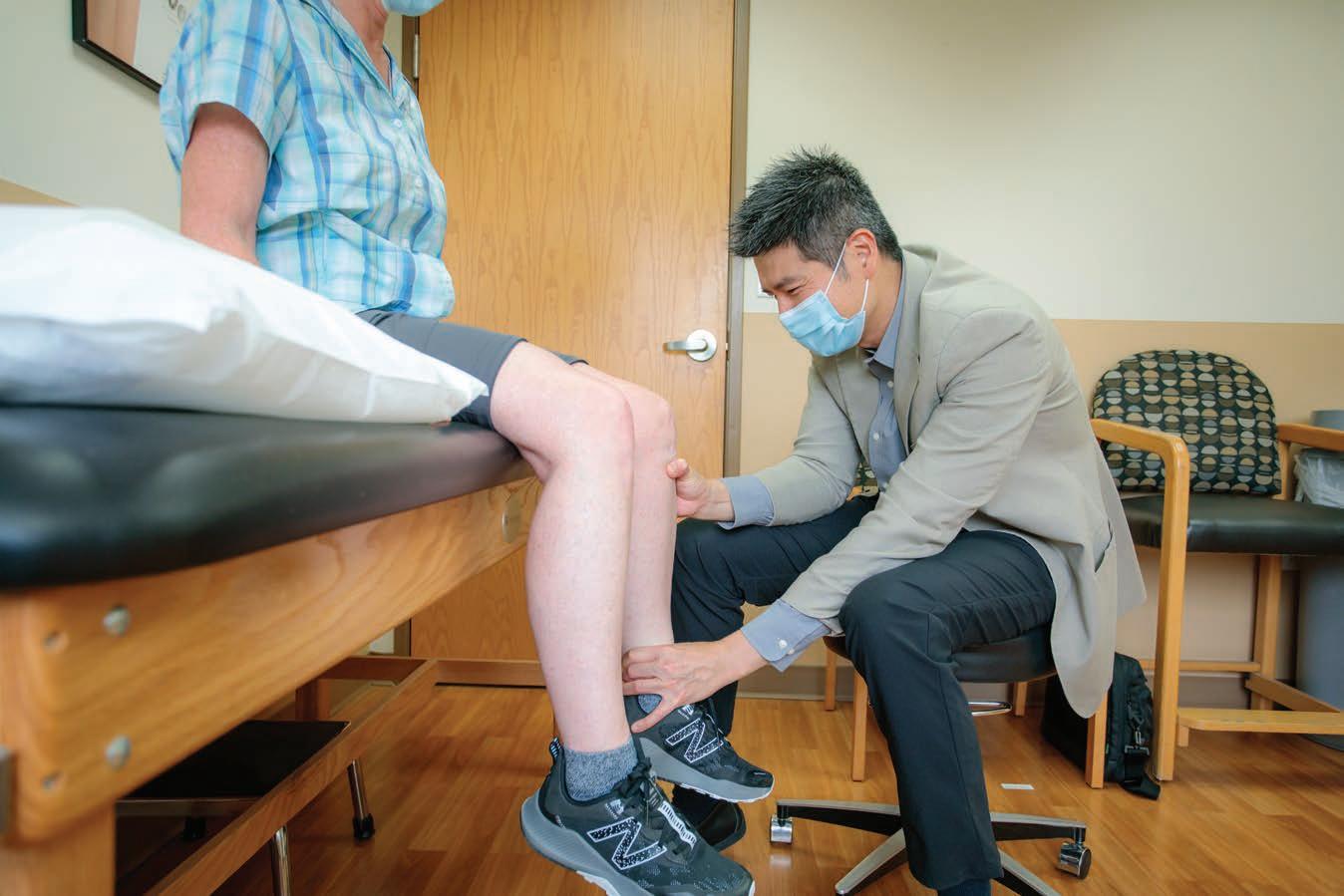
Dawn McGonagle, left, and David Sprunt stand on burned grass where a fi re sparked just feet from their homes on the night of March 24.
PHOTO BY ROBERT TANN
‘I was terrifi ed’: Neighbors recall fi re just feet from their homes at Jackass Hill Park
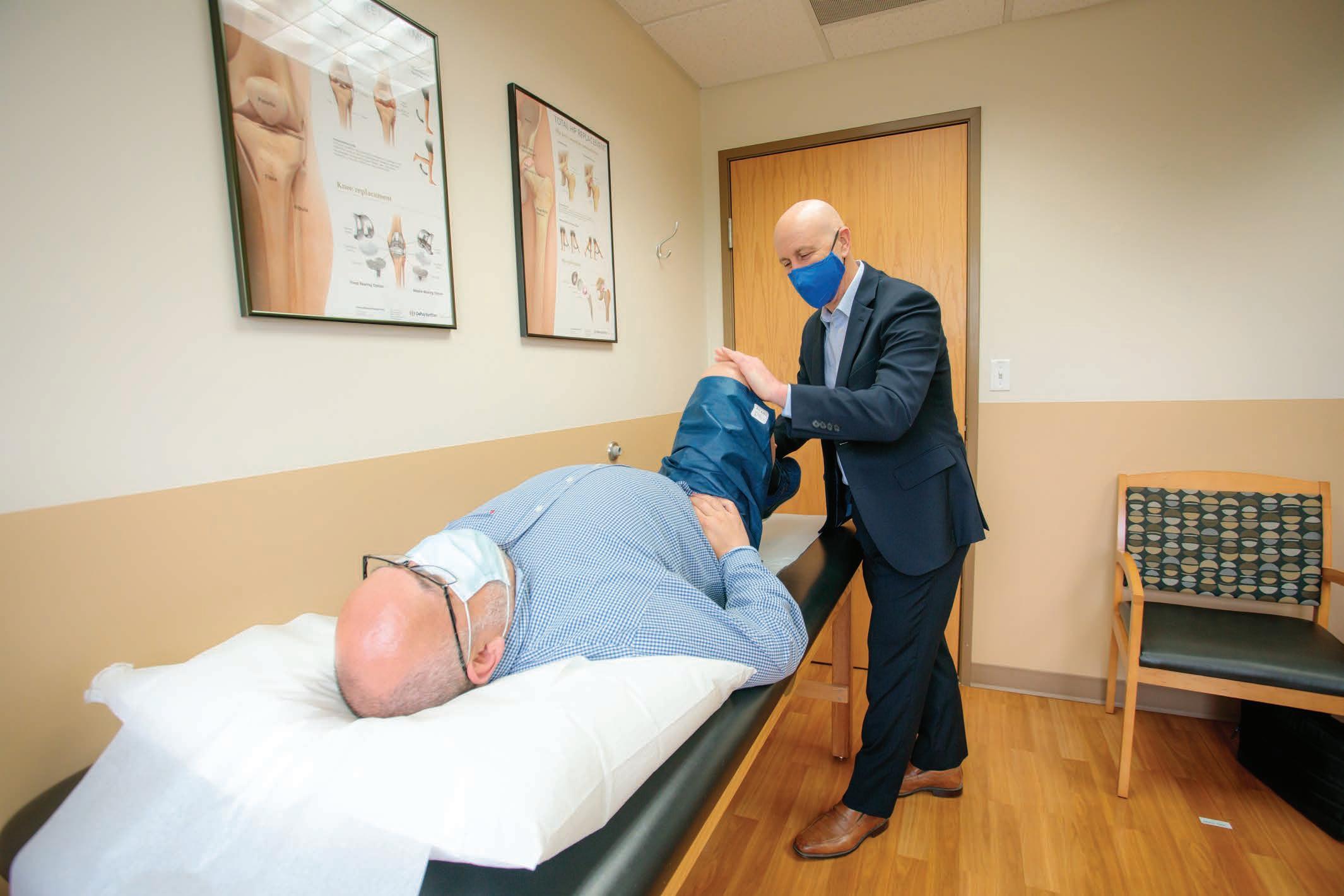
Fireworks incidents have plagued area, residents seek solutions
BY ROBERT TANN RTANN@COLORADOCOMMUNITYMEDIA.COM
First, there came a loud “BANG,” then Dawn McGonagle saw the fl ames just feet from her home.
“I looked out the door, and then I grabbed the phone,” McGonagle said.
With fi refi ghters on their way, several neighbors ran outside to fi ght the fi re with a hose, an extinguisher and their feet, stomping and dousing the fl ames as fast as they could.
The grass fi re at Jackass Hill Park in Littleton on March 24 burned for just minutes, with the fl ames igniting around 9:40 p.m. and out by about 10 p.m. according to South Metro Fire Rescue spokesperson Eric Hurst.
But for some neighbors that night, the situation could have easily spiraled into disaster.
“I was terrifi ed, absolutely terrifi ed,” McGonagle said, with the nearby fl ames evoking scenes from the devastating Marshall Fire in Boulder County that burned more than 1,000 homes in late December.
“You start thinking ‘what do I need to take?’” McGonagle said. “That went through my mind, because you never know.”
Littleton police, who were also on scene during the incident, believe the fi re was caused by a bottle rocket fi rework, but found no suspects, according to spokesperson Sheera Poelman. Under Colorado law, any fi reworks that leave the ground, such as bottle rockets, are illegal.
“As always, we respond when we can to our best ability, and if there’s any criminality we try to investigate it,” Poelman said, who urged residents to continue to report future issues. “If you see anything, say something.”
Residents said the March 24 incident was far from the fi rst time they’ve dealt with fi reworks.
“I was watching TV and I heard the fi rework go off, one big explosion. And I remember thinking there goes another one,” said David Sprunt, who lives just a few houses down from McGonagle on Sunset Drive.
Sprunt said fi reworks have been a frequent problem at the park for roughly the past fi ve years, though it’s been “more often than it used to.”
Residents began raising the issue in the summer of 2019 when they notifi ed South Suburban Parks and Recreation, which owns and manages the park.
Littleton City Councilmember At-Large Pam Grove, who sits on the South Suburban Parks and Recreation Subcommittee, said she has been aware of the issue for more than a year and on March 8, 2021, sat in on a neighborhood meeting to discuss possible remedies.
Along with fi reworks, residents have complained of trash, smoking and general disruptive behavior from park-goers, especially late at night. It’s led some to ask for a reduction in park hours, more signage about rules and possible patrols.
“It’s a tricky problem, because you want people to be able to use the park responsibly,” Sprunt said.
Grove said she has “a lot of empathy for those residents who live by the park” and that “some people come, often late at night, and destroy the park.”
“I personally would like to make a plea to the people that use this park to be respectful to other park users,” Grove said, adding that she hopes South Suburban will take action on some short-term solutions.
In an email statement, South Suburban said it will “meet with the representatives from the neighborhood in the next few weeks to share solutions and receive feedback.”
“This is in addition to the longterm site specifi c plan South Suburban is creating for Jackass Hill Park,” the statement continued. “SSPRD has hired Architerra Group to lead the process that begins Friday, April 1. The process will include at least two public input meetings and a mailed survey. The plan aims to be completed in fall 2022.”McGonagle said she respects the process but hopes she and other residents can see solutions soon.
“It’s been slower than we had hoped for,” McGonagle said. “But I am thankful that they are meeting with us and are considering options to help us. I think we’re making progress.”



